| Lot |
Photo |
Description |
Lot 1 |
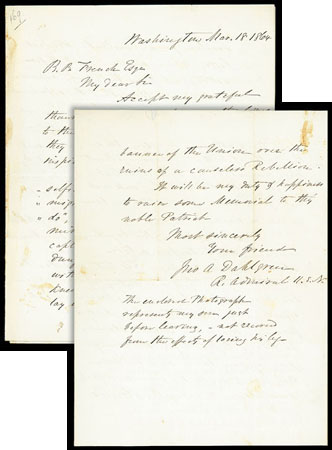 |
Dahlgren, John A., 1809-1870, Union admiral; personal friend of Abraham Lincoln; the "father of American naval ordnance"
A.L.S., signed Jno A Dahlgren, Rear Admiral, U.S.N., four pages, 4to., Washington, March 18, 1864. To B.B. French, Winfield Scott's Chief of Staff.
Letter of thanks for a poem written by French in tribute to Dahlgrenís son, Ulric, who lost his life in a failed rescue attempt of Union prisoners in Richmond. Dahlgren writes, in part: "His last letter to me, written just before setting out from the camp, expresses the conviction that the enterprise Ďif successful will be the grandest thing on recordí — calls it Ďa desperate undertakingí and ends thus ĎI will write you more fully when we return — if we do not return there is no better place to give up the Ghost.í And so he fell, as a gallant soldier of the great cause should fall, at the head of his men."
Dahlgren encloses a carte-de-visite photo of his son and notes "The enclosed photograph represents my son just before leaving, not recovered from the effects of losing his leg."
Also appended is the two-page poem written in Frenchís hand, March 10, 1864.
Minor mounting stains at left and on verso (Frenchís poem), Very Fine. Complete transcription available on request.
Estimate 3,000 - 4,000
Ulric Dahlgrenís ill-fated attempt to free Union prisoners from the prison camp at Belle Isle and from Libby prison was one of the Civil Warís most daring cavalry raids. The raid, which was conceived by the controversial General Judson Kilpatrick [the raid is sometimes referred to as Kilpatrickís folly] was personally approved by Lincoln. Dahlgren, with a force of about 500 men, was to dart in, covered by diversions led by Generals Custer and Sedgwick and liberate the camps. Unfortunately, on the night of March 2, 1864, Dahlgrenís commando force was discovered by a sizable force of Confederates. Although he managed to escape, he was ambushed a second time about two hours later and killed. His men surrendered shortly thereafter. The Confederates allegedly searched his body and found a speech to his troops, written and signed by him, suggesting that Dahlagren intended to sack Richmond and assasinate Jefferson Davis. The Confederates published the text of this letter in a Richmond newspaper and General Meade, upon seeing the publication, promptly addressed a letter to General Lee disavowing any official knowledge of such a plan. Dahlgren died a full colonel at the age of 21.
View details and enlarged photo
|
Lot 2 |
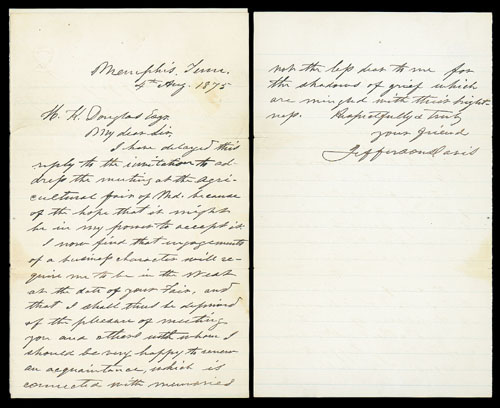 |
Davis, Jefferson, 1808-1889, U.S. Secretary of War, 1853-1857 (Frankin Pierce), President of the Confederacy, 1861-1865
A.L.S., signed your friend, Jefferson Davis, 2 pages, 8vo., Memphis, Tenn. Aug. 4, 1875. To a Mr. H.K. Douglas.
Sends regrets about not being able "to address the meeting at the agricultural fair of Md."and that he will not be able "to renew an acquaintance, which is connected with memories not the less dear to me for the shadows of grief which are mingled with their brightness."
Second, blank leaf detached, minor soiling, Very Fine. Complete transcription available on request.
Estimate 2,000 - 3,000
Colonel Henry Kyd Douglas was a member of Stonewall Jacksonís staff.
View details and enlarged photo
|
Lot 3 |
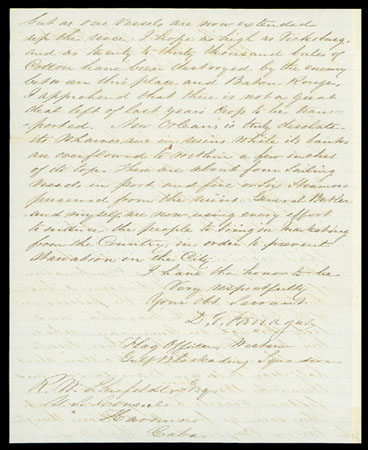 |
Farragut, David G., 1801-1870, Union Admiral; commanded the West Gulf Blockading Squadron; won the battle of Mobile Bay, then, without bloodshed, captured New Orleans
L.S., signed D.G. Farragut, two pages, 4to., U.S. flag Ship "Hartford" Off the City of New Orleans, May 5, 1862. To R.M Shiefeldt, U.S. Consul in Havana, Cuba. With integral docketed leaf attached.
Farragut sends news of the various routes blockade runners were using and of the desperate conditions in New Orleans, four days after the occupation of that city He writes in part: "…twenty to thirty thousands bales of cotton have been destroyed by the enemy between this place and Baton Rouge, I apprehend that there is not a great deal left of last yearís crop to be transported. New Orleans is truly desolate — its wharves are in ruins while its banks are overflowed to within a few inches of its top. There are about four sailing vessels in port, and five or six steamers preserved from the ruins. General Butler and myself are now using every effort to induce the people to bring in marketing from the Country, in order to prevent starvation in the City…"
Tipped into reinforcing frame around second leaf, fresh and Very Fine. Complete transcription available on request.
Estimate 4,000 - 6,000
A combined Army-Navy force was sent to close Mobile Bay to blockade running. Farragutís Union fleet of eighteen ships entered the heavily mined Mobile Bay and received devastating fire from Forts Gaines and Morgan and other points. Union mortar boats began bombarding the forts but after a week Farragut assessed that the mortars were doing little damage. At 2 a.m. on April 24th, with the immortal words "Damn the torpedoes, full speed ahead!" [mines were referred to as torpedoes at the time] he gave the signal for the fleet to run past the forts. By dawn his entire force had done so without losing a single ship. He continued up the river and captured the undefended city of New Orleans the next day.
View details and enlarged photo
|
Lot 4 |
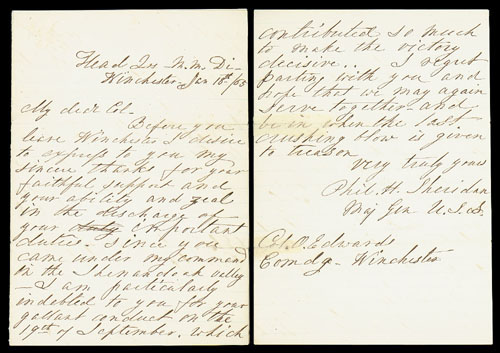 |
Sheridan, Philip Henry, 1831-1888, Union general; deployed his Army of the Shenandoah across Confederate line of retreat from Appomattox forcing Leeís surrender
A.L.S., signed Phil. H. Sheridan, two pages, 8vo., Head Q[uarte]rs, M[iddle] M[ilitary] Di[vision], Winchester, January 18, 1865. As Major General, to Colonel O[liver] Edwards, hero of Spotsylvania.
Letter of thanks and appreciation to Edwards for his "faithful support and your ability and zeal in the discharge of your important duties since you came under my command in the Shenandoah Valley. I am particularly indebted to your for your gallant conduct on the 19th of September [at Harris Farm], which contributed so much to make the victory decisive. I regret parting with you and hope that we may again serve together and be in when the last crushing blow is given to treason."
Very Fine and rare war-dated Sheridan letter. Complete transcription available on request.
Estimate 4,000 - 6,000
Sheridan had offered Edwards the post of provost marshal general of the Middle Military Divisions, but he declined it, preferring instead to remain in the field.
View details and enlarged photo
|
Lot 5 |
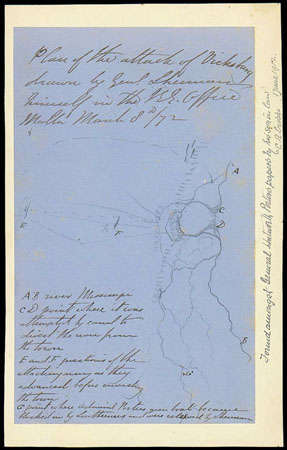 |
Sherman, William Tecumseh, 1820-1891, Union general; took part in the capture of Vicksburg; made famous "March to the Sea" through Atlanta, Savannah, and The Carolinas; received surrender of Johnstonís army.
Autograph Manuscript, signed in text, one page, 8vo., March 8, 1872. With a sketch of a map of Vicksburg, in pencil.
Sherman has drawn a map of the plan of attack on Vicksburg, with explanatory notes regarding strategic positions: "AB river Mississippi/ CD point where it was attempted by canal to direct the river from the town/ E and F positions of the attacking army as they advanced before invading the town/ G point where Admiral Porters gun boats became blocked in by Southerners and were relieved by Sherman." At the top, in a larger hand, which also appears to be Shermanís, is written "Plan of the attack of Vicksburg drawn by Genl. Sherman…Malta, March 8th/ 72"
Mounted on a card with manuscript inscription "Found among General (…) Porterís papers by his son in law C.R. Crosse, 1 June 1912", Very Fine.
Estimate 5,000 - 7,500
The Vicksburg Campaign was essentially the Unionís strategic penetration of the south down the Mississippi River, and in this map with its notes, Sherman documents some points of attack: Admiral Porter with 11 vessels pushed his way through the heavily obstructed waterways while Sherman followed with foot troops. The Confederates, however, stopped the boats at Rolling Fork and almost succeeded in bottling up and destroying Porterís fleet. Word of Porterís situation reached Sherman late in the day. Undertaking a daring night march, lighted by candles stuck in their rifle barrels, Shermanís men arrived in time to save Porter [Boatner, The Civil War Dictionary].
View details and enlarged photo
|
Lot 6 |
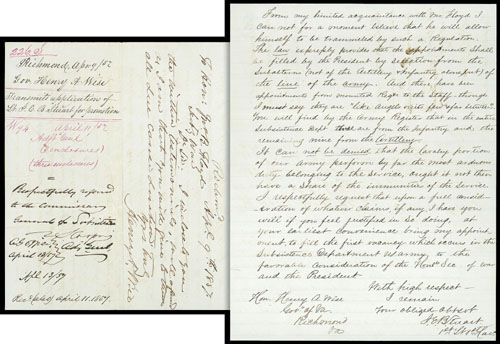 |
Stuart, James Ewell Brown (Jeb), 1833-1864, Confederate general and cavalry leader; killed at the battle of Yellow Tavern.
A.L.S., signed J.E.B. Stuart, 1st Lt 1st Cav, three full pages, 4to, Fort Leavenworth, Kansas Territory, March 23, 1857, to Henry A. Wise, governor of Virginia. With an A.L.S. by Wise to fellow Virginian, John B. Floyd, Secretary of War, written on the verso; and with an Autograph Endorsement by Samuel Cooper, later a Confederate general. Written while on frontier duty.
As a young lieutenant, Stuart pleads his case for a promotion to a staff position, putting forth an articulate argument, disparaging somewhat Jefferson Davis, the outgoing Secretary of War. He writes, in part: "I understand (I have not seen them yet) that the Edition of the Army Regulations published just as Mr. Davis made his exit from the War Dept, have the extraordinary provision that no mounted. [mounted] officer shall be eligible to appointment in the Staff Departments. I can only account for such an absurdity by supposing that the unjust proscription of the Subalterns of the mounted Regt has been so long practically followed out, that it has passed unnoticed into the code. Any one endowed with reason common sense and, a common sense of Justice, except Mr. Davis [emphasis ours…Ed.], must agree that such an outrageous distinction has no foundation whatever in either law, justice or reason. And further: "It can not be denied that the Cavalry portion of our Army perform by far the most arduous duty belonging to the Service, ought it not then have a share of the immunities of the Service."
On the verso, Governor Wise has written: "I enclose to you within testimonials, well assured as I am that you will give to them all due consideration." Samuel Cooper then refers the matter to the Commissary General of Subsistence.
Fresh and Very Fine. Complete transcription available on request.
Estimate 15,000 - 20,000
Four and a half years after Stuart makes this plea for promotion out of the combat ranks, Jefferson Davis, now president of the Confederacy, appoints him Brigadier General.
View details and enlarged photo
|
|